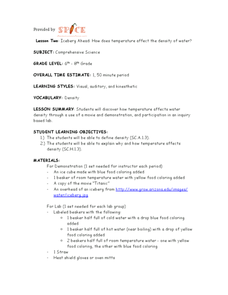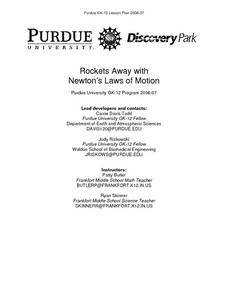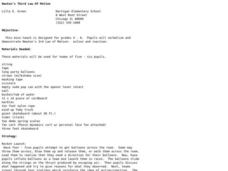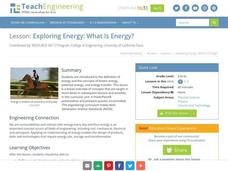Curated OER
Water Pressure Blaster
Third graders complete an experiment to introduce them to the concept of water pressure. In this water pressure lesson plan, 3rd graders create pressure in a water bottle and observe the force of water that is created.
Discovery Education
Motion in the Ocean
How do temperature changes affect ocean currents? Scholars explore convection currents by demonstrating the flow of water in a baking dish. They use ice, heat, and food coloring to see currents. Then, they draw conclusions about their...
Curated OER
Iceberg Ahead: How Does Temperature Affect the Density of Water?
Demonstrate how ice floats on water and get the class thinking about why icebergs are so deceiving. Investigators then experiment with mixing water of the same temperature and water of different temperatures. Make sure to explain the...
Discovery Education
Smoke on the Water
How do clouds form? Learners demonstrate the formation of clouds and the water cycle by testing four different setups in a plastic bottle. They identify the key components of a cloud to help them understand the process of cloud...
American Chemical Society
Molecules in Motion
I heard that oxygen and magnesium were going out and I was like "O Mg." Pupils experiment with adding food coloring to water of various temperatures in order to determine how temperature impacts molecular movement. This is the...
NASA
Pop Can Hero Engine
Hang a soda can from a string and watch it spin by the force created by water streaming out of slanted holes. This plan provides background information, detailed materials and procedures, discussion questions, a lab worksheet, and...
Curated OER
The Motion of Molecules in Water
Students observe the motion of water molecules using food coloring. In this molecule movement lesson plan, students observe motion in hot, cold and room temperature colored water and record observation data on record sheets. Then write a...
Curated OER
Matter and Molecular Motion
Fourth graders define the states of matter and their properties. They demonstrate the air is matter and observe the effect of molecular motion through these activities.
Curated OER
Rockets Away with Newton's Laws of Motion
Eighth graders comprehend Newton's Laws of Motion and to use the scientific method in rocketry sub-unit. They work through the scientific method. Students illustrate how science and Newton's Laws can be used in everyday situations and...
Curated OER
Water Cycle Bag
Students enclose water in an airtight bag and leave it in a warm area to view the water cycle. In this water cycle lesson plan, students observe evaporation, condensation, and precipitation. They then discuss what they learned about the...
American Chemical Society
Temperature Affects Density
Different substances can have different densities, but can the same substance have different densities? Lesson explores the effect of temperature on the density of water. Extension idea connects the concept of how melting ice in lakes...
Cornell University
Buoyancy
Swimmers know to float by turning their bodies horizontally rather than vertically, but why does that make a difference? In an interesting lesson, scholars explore buoyancy and the properties of air and water. They test cups to see which...
Curated OER
3-2-1 Pop!
Students investigate how rocket liftoff demonstrates Newton's Laws of Motion. They participate in a class discussion, and construct a rocket powered by the pressure generated from an antacid tablet reacting with water.
Curated OER
Boating Safety and Water Sports - Lesson 3 - First Aid
What are the basic first aid supplies that should be on a boat? What should be done when someone stops breathing and/or their heart stops beating? Lesson three is only one of twenty-two lessons on boat safety. This lesson is about first...
Curated OER
Water Cycle Boogie
Young scholars explore the water cycle. They learn the "Water Cycle Boogie." Students create hats to represent the different parts of the cycle and learn hand motions to go with the words of the song. Young scholars practice singing the...
Teach Engineering
A Shot Under Pressure
You've got to pump it up! Using the equations for projectile motion and Bernoulli's Principle, class members calculate the water pressure in a water gun. The pupils collect data on the number of pumps and distance traveled in order to...
Curated OER
Newton's Third Law of Motion
Students explore Newton's 3rd Law of Motion. In this physics lesson, students participate in various experiments that demonstrate the idea of action/reaction, such as a balloon launch, a skateboard activity, and a spring scale...
Curated OER
Newton's Laws of Motion
Sixth graders explore Newton's laws of motion with their own bodies. In this relative motion activity students will use a wide range of materials bringing them from the concrete to the abstract on video. Students will draw inferences...
Curated OER
Sold! Ageless Water
Students read "Tuck Everlasting" by Natalie Babbitt. They create an advertisement for the spring water described in the story.
American Chemical Society
Changing State: Melting
Dry ice is extremely cold — it is -109.3°F or -78.5°C. Scholars observe and explain the molecular motion associated with melting. Then they design their own experiments to speed up the melting process. Finally, a teacher presents a...
Teach Engineering
Exploring Energy: What Is Energy?
...Then the water heater exploded like a bomb. Using a video of an exploding water heater, the resource presents the definitions of energy, potential energy, and kinetic energy to be used in later lessons of the unit.
American Chemical Society
Heat, Temperature, and Conduction
How does heat move from one item to another, even when the items are in different states of matter? Pupils experiment with adding washers to hot water and adding hot washers to room temperature water to observe the heat transfer.
Curated OER
Diffusion of Molecules
Students conduct a series of experiments to observe factors that impact molecular movement. In this molecular chemistry instructional activity, students drop food coloring in water with different properties (hot, with ice, with alcohol)...
Curated OER
Applied Science - Physics Pre-Lab
Students observe fluid motion. In this Physics lesson plan, students explore the principles of Pascal, Archimedes, and Bernoulli. Students list their experiences with fluid movement.

























